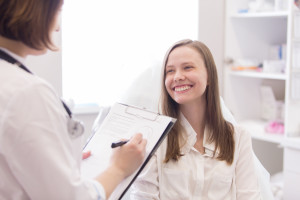When Should You Take Your Daughter for Her First OB-GYN Appointment?
 As your daughter moves from child to adolescent, to young woman, she will experience a variety of firsts—and so will you. A critical rite of passage in her transition to adulthood, and in her pursuit of optimal health, is her first visit to an obstetrician-gynecologist (OB-GYN) for a routine exam—but when is the right time to take that step?
As your daughter moves from child to adolescent, to young woman, she will experience a variety of firsts—and so will you. A critical rite of passage in her transition to adulthood, and in her pursuit of optimal health, is her first visit to an obstetrician-gynecologist (OB-GYN) for a routine exam—but when is the right time to take that step?
Why Young Women Need Routine Gynecology Exams
Gynecology exams are not only critical for women who are pregnant or looking to become pregnant, or for women who are presenting symptoms of concern. The American College of Obstetrics and Gynecology (ACOG) recommends that all women should obtain an annual screening, and that includes young women. Even if your daughter is not complaining of any health issues, such as painful or irregular periods, she should still receive proactive, regular examinations.
Regular gynecology exams for young women provide:
- A safe space to ask questions and receive information about such topics as sex and body changes from a trusted source.
- Preventive education and dialogue regarding the risks of sexually transmitted diseases and unplanned pregnancy.
- Necessary diagnoses and treatments for women who present with symptoms.
When Should a Young Woman Have Her First Visit with an OB-GYN?
The ACOG recommends that young women should have their first visit with an OB-GYN between the ages of 13 and 15. Ideally, you will want to schedule your daughter’s first appointment after her first menstrual period. At this point in her life, your daughter should be well aware of her changing body and may have questions she’d like to ask you or a doctor.
What Will the First Visit Entail?
Both mothers and daughters should know what to expect from the first visit. Typically, a young woman’s first appointment with an OB-GYN will include a general physical exam and an external genital exam. An internal examination (or pelvic exam) of the reproductive organs will typically not take place until age 21 for women without any health issues. If your daughter who is under the age of 21 is experiencing such health concerns as abnormal bleeding or painful periods, your OB-GYN may recommend a pelvic exam sooner. Also, OB-GYNs typically recommend a Pap smear every three to five years, but not until age 21.
The Supportive Role You Will Play in Your Daughter’s First Exam
Even if she understands what to expect, a young woman’s first gynecological exam may cause her to feel nervous or uncomfortable, which is why it is critical that she has the support every step of the way. Talk to your daughter before the exam. Make sure she understands what to expect and answer any questions she may have. Foster open dialogue and make sure she knows that even if she fears her questions may be silly, that you are willing to answer anything with honesty and respect.
Your daughter may or may not want you to be in the room with her when she has her first exam, but make sure she understands that either way, you are there to support her before, during, and after her first and all future visits with her OB-GYN.
Chuochani, Sayegh and Robinson MD is accepting new patients. Please give us a call today if you’d like to schedule an appointment.
